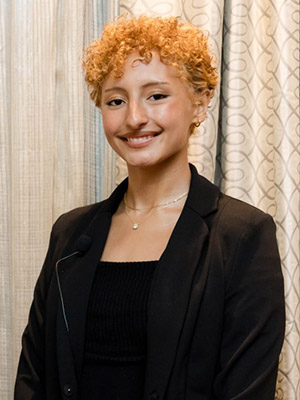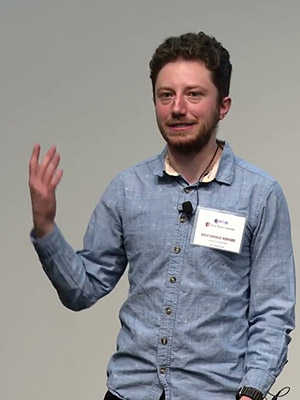Stony Brook’s Center for Changing Systems of Power (CCSP) presented a roundtable featuring four summer grantees who each had an opportunity to share their work and its impact. Students from four disciplines spoke about projects that created meaningful change this past summer.
“This is the first year we’ve done this and we hope to do it every year,” said Manisha Desai, executive director of CCSP and the Empowerment Trust Endowed Professor of Global Citizenship at Stony Brook University. “This program is to fund our students, grad and undergrad, who are doing work that’s related to social justice locally or globally.”
 Kamilah Pasha
Kamilah Pasha
Kamilah Pasha ‘26, a social work major and CCSP Summer Social Justice grantee, addressed mental health disparities among youth in underserved communities. In Central Islip, New York, 41.8 percent of residents live below the poverty line, and of that percentage, 1 in 5 children have mental, behavioral, or developmental disorders. Pasha’s project, “Mental Health Toolbox,” tackles the challenges families face in prioritizing mental health care amid rising costs of living and limited social support systems.
“This number is attention grabbing,” said Pasha, who noted that families facing economic hardship put mental health on the back burner, which creates a generational cycle of trauma and other missed opportunities. “It infuriates me because the issue isn’t changing, and New York State’s mission on poverty and the economy focuses on child tax credits and inflation refunds, instead of adjusting the systemic injustices. Long Island is one of the most segregated places in America so this becomes a multifaceted issue no longer about economics alone but race as well.”
Pasha’s approach centers on preventative, early-intervention strategies in special education classrooms. Each toolkit includes sensory items such as fidget tools, stress balls and noise-canceling headphones, alongside educational resources for teachers and parents. By fostering self-awareness, autonomy and curiosity about emotional well-being and social connection, Pasha’s toolkits help bridge gaps in mental health support that many families in low-income communities may not otherwise access.
 Merica Griffin
Merica Griffin
Merica Griffin’s project, “Indigenous Land and Cultural Sovereignty,” combines academic research and creative work focused on Indigenous land and cultural sovereignty. The first component supports ongoing research on public policy and environmental justice in Latin America, contributing to manuscript development for future publication. The second uses environmental artivism through photography to document Indigenous knowledge and highlight Stony Brook University’s location on Setalcott Nation land. With grant support, the project aims to advance scholarship on Indigenous land rights while fostering campus engagement through visual storytelling.
“Oftentimes, through colonialism, these countries do not have sovereignty,” said Griffin ’25, a double major in sociology and political science. “Specifically, what we are looking at is fire policy. Through lack of land sovereignty, these communities aren’t able to steward their land.”
Fire policy often involves the use of prescribed burns to manage and benefit flora in many ecosystems. The practice is a key part of conservation and land management, working to maintain healthy and diverse plant communities. Griffin’s project created a data set on each country in South and Central America, in the Caribbean, and looked at their ability to have access to their land and collaborate with their local and state governments. Griffin also looked at the indigenous history of Stony Brook and Long Island.
“Long Island is separate from South and Central America, of course, but there is still an indigenous history,” she said. I wanted to look at Long Island through a photography lens.”
Over the summer, Griffin visited and photographed Long Island’s state parks. “There’s history to why things are state parks, or why they’re protected lands,” she said. “I would love to get in contact with people on the university grounds through the artivism lens and showcase Long Island so we can be more aware of the history of this land. I want to be able to connect my project, which is more of a global sense, into Long Island as well. I think it would enrich Stony Brook to showcase that art.”
 Ariek Norford
Ariek Norford
In a presentation called “Settler Colonialism, Ecocide, and the Climate Crisis in Occupied Palestine,” Ariek Norford, a PhD candidate in ecology and evolution, re-examined Palestine’s history of loss of land through the lens of socioecology. Norford’s project focuses on the environmental justice impacts of Israel’s occupation, and examines how land confiscation, habitat destruction, and ecological degradation contribute to health disparities for Palestinians.
Drawing on expertise in ecology and farming communities, the research synthesizes findings on olive grove destruction and afforestation. This work also represents a first step in integrating academic research on community-driven conservation with social justice advocacy for the Arab community, building skills to bridge research and practice.
“My part of this research was as a Palestinian who is familiar with Palestine’s history, and also as an ecologist who works in farming communities,” said Norford. “It’s this connection between people and the land where neither can live without the other, and it’s very contrary to Western thinking of people and nature as separate.”
Norford said that settler colonialism is a system of oppression based on the displacement of native populations, and often includes cultural and material genocide to replace it with a new settler population. “One tool of this is ecocide, which is unlawful acts committed with knowledge that there’s a substantial likelihood of severe and either widespread or long term damage to the environment,” said Norford. “This can be so damaging for indigenous and native communities.”
Norford’s discussion focused on the public health implications of loss of land in occupied Palestine, which has caused subsequent malnourishment, dependence on foreign aid, and a breaking of traditional communal social structures.
Another study, “Using EEG to Explore How Cultural Context and Racism Affect the Brain and Mental Health,” was done anonymously by a PhD candidate in clinical psychology. It examined how race-related social rejection may contribute to mental health disparities by investigating its neural correlates using reward positivity (RewP), an EEG-based marker linked to depression and social processing. By analyzing RewP responses to same-race versus other-race social interactions, the project aims to better understand how racial discrimination translates into stress and depression risk. This research represents an early step toward identifying culturally sensitive neurobehavioral markers of depression in minoritized populations.
“In a meta-analysis, stress and depression were among the top three most frequently reported mental health problems associated with racism,” said the researcher.
The research found that the association between racism and negative mental health was significantly stronger for Asian American and Latino, Latin American participants compared to African American participants. However, the mechanisms through which racism affects mental health problems remain unclear.
“Social rejection has been proposed as one of the possible pathways through which this translates,” said the researcher. “Race-based rejection sensitivity was associated with greater negative emotions in African American students, and racial discrimination is also associated with personal insecurity and social interactions, which could lead to increased distress. So there is a small and growing body of research that is starting to look at neurobiological measures of race-related social processing.”
“CCSP’s mission is to promote epistemic, aesthetic, and social justice locally and globally,” said Desai. “By providing grants to undergrad and grad students working on these issues we hope to be a bridge to community engaged research, activism, and advocacy that contributes to social justice at home and abroad.”
– Robert Emproto
